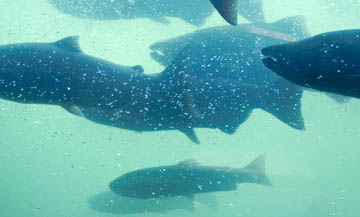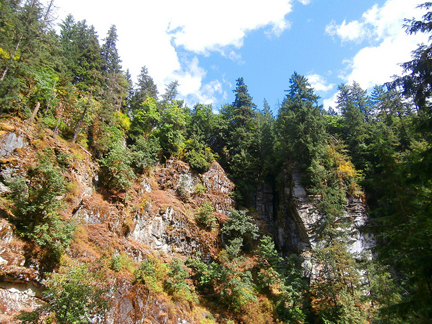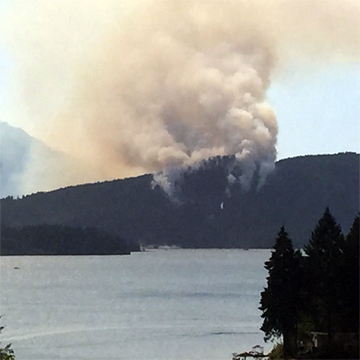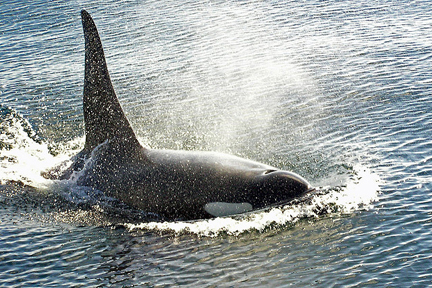She had moved to the area only the year before, lured by the climate, the year-round greenery, and Victoria’s reputation as a city of flowers. Her new home included a garden, with one rocky section that saw little sun. Moss would thrive there, but she wanted something more dramatic. More »
The killing of Cecil the Lion by big-game hunters in June outraged the world.
Thirteen-year-old Cecil lived in Hwanga National Park, Zimbabwe, where he was a major attraction for wildlife tourists. He may have been lured out of the park prior to being killed.
Yet this is one animal, albeit a charismatic, celebrity critter. Thousands of wildlife crimes occur every year. The World Wildlife Fund estimates, for example, that customs officials intercept ivory from only about 11 per cent of the 50,000 African elephants poached every year.
Here in B.C., officials have helped uncover some wildlife crimes recently. More »
The hottest, driest summer on record for British Columbia ends this week, three weeks after the first substantial rains in months cleared the air. We will, however, be paying for this past summer for years to come.
Wildfires cost the province more than $260 million so far this year, well over the $63 million allotted. Even though B.C. posted a budget surplus this spring, belts across government will tighten to cover the unplanned-for extra expense. We’ll pay for that when we access programs and services. More »
 River levels in southern B.C. are low, and their temperatures are warmer than normal. Fish are seeking shelter in deeper, larger, cooler pools wherever they can. With fish pooled in creeks and rivers, disease spreads more readily, and predators have an easier time making their catches of the day.
River levels in southern B.C. are low, and their temperatures are warmer than normal. Fish are seeking shelter in deeper, larger, cooler pools wherever they can. With fish pooled in creeks and rivers, disease spreads more readily, and predators have an easier time making their catches of the day.
Returning salmon, of course, can’t choose to spend their final months hiding out in cool pools. Their biology drives them to reach their gravel beds of origin in time to spawn. While they may rest in deeper pools en route, the imperative sends them away from shelter into whatever channels contain enough water to allow them to fight their way upstream, no matter the water’s temperature.
Warm water causes fish to use more energy and tire faster. Warm temperatures can change freshwater chemistry, affecting the amount of oxygen dissolved in the water and available to fish and other critters. More »

More than 500 species of glass sponge exist. Only some of them have the fused-glass skeletons that lead to the creation of reefs such as those found off B.C.’s coast. Photo: NOAA Okeanos Explorer Program, Gulf of Mexico 2012 Expedition
In recent decades, species of sponges thought to have gone extinct 100 million years ago have been found in B.C.’s coastal waters. They not only make these waters home, but they make homes for themselves and many other creatures.
Now the federal government is moving to safeguard these rare organisms and the unique underwater ecosystems they have created. In early June, Fisheries and Oceans Canada closed B.C’s glass-sponge reefs to all fishing.
In addition, proposed, new marine protected areas will prohibit all seafloor-disturbing activities on and immediately around three glass-sponge reefs in Hecate Strait and Queen Charlotte Sound. The protection focuses on the reefs and small buffer zones, with various activities allowed beyond and in the water column above….
Read the rest of this editorial at the Victoria Times Colonist….
For a week, Nature Boy gasped and panted under dense skies. He flopped from sweaty seat to shade-enshrouded room in search of hints of coolness. He marveled at a sun that glowed orange throughout the day and lit everything with a buttery, evening light at midday.
The hot weather over the west coast sent many Victorians rushing to stake out blanket-sized patches of beach early in the morning. Others scurried into the welcome relief of air-conditioned offices. As for Nature Boy, he took to spending his afternoons in cool, dark cinemas.
The system that brought the weather also held Vancouver Island and the Lower Mainland in a form of hot smoker. It suffused the coast in the fumes of the region’s wildfires.
In Vancouver, the outlook was labelled “Martian skies.”
The recent Big Smoke gave us a taste and whiff of our own coastal rainforests going up in flames, here, in a place normally known for clean air and fresh ocean breezes. With our itchy eyes and scratchy throats, we felt the chemical and particulate ghosts of thousands of trees being partially cremated at Dog Mountain, Sechelt Inlet, Port Hardy, and in other wildfires in the region….
Read the rest of this editorial at the Victoria Times Colonist….
Now that the school year has run its course, the exodus has begun. Those who seek to take advantage of the coming interrupted workweek have made their reservations, packed their bags, and made their escapes. Others are taking their time, planning the requisite excursions to visit family, see new sights, and experience new adventures later during the season.
It’s also around this time that the latest data and surveys on travel intentions and travel habits become known. Every June, BMO Financial Group releases its latest survey results about Canadians’ summer travel plans. This year, survey says, B.C. residents intend to take a mental vacation from worrying about money. We, apparently, each plan to spend more than $6,000 on vacations, summer outings and entertaining at home. We rank second in Canada in profligacy, although the report also says that more than 40% of Canadians have not yet set budgets for summertime expenses.
Statistics Canada indicates we like to travel abroad. Fewer B.C. residents traveled to the U.S. for spring break this year compared to last, while more of us travelled to other international destinations.
Another trend appeared earlier this year in the spring break BMO travel survey. Apparently, we British Columbians are a cautious lot. We rank third in Canada for worry about needing medical attention while abroad—even though our provincial worry quotient nips at the heels of the national average (41 per cent). We are also among the most likely of all Canadians to purchase travel health insurance for our excursions abroad….
Read the rest of this editorial at the Victoria Times Colonist….
Among groups of people, ignoring somebody is often considered a sign of disrespect. The word disrespect itself means disregard, overlook, to not acknowledge or look at something.
Over the last dozen years, we have seen disrespect for federal legislation. The Species at Risk Act became law in December 2002, but for most of its existence it has been disregarded by the very government responsible for enacting the law.
No wonder citizen groups are striking out independently. For example, the Raincoast Conservation Foundation, the Dogwood Initiative, Northwest Wildlife Preservation Society and South Vancouver Island Anglers Association recently announced they would start taking their own action to save the region’s orcas.
The feds declared southern resident orcas endangered 12 years ago. The Species at Risk Act requires the government to develop recovery strategies and action plans for the species within a set period. However, the required federal action plan to protect orcas remains incomplete….
Read the rest of this editorial at the Victoria Times Colonist….








